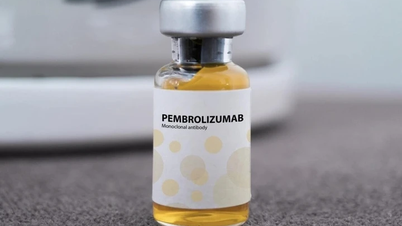Modern science has proven these wonderful uses and discovered many more health potentials from this plant.
Support bone and joint health
Ferns are a rich source of calcium, which plays an important role in building and maintaining strong bones. Calcium is an essential mineral for bone development, especially in children and adolescents, and helps prevent osteoporosis in older adults.
In addition to calcium, ferns also contain many compounds that are beneficial to health, especially flavonoids. Flavonoids are powerful antioxidants that have effective anti-inflammatory and pain-relieving effects. Therefore, ferns can help improve the uncomfortable symptoms of arthritis and osteoarthritis, helping patients move more flexibly and improve their quality of life.

Ferns are a rich source of calcium. (Photo: Getty Images)
Enhance eyesight
Vitamin A in fern leaves plays an important role in protecting eye health. It helps maintain corneal transparency, improves night vision, prevents dry eyes and age-related eye diseases such as macular degeneration.
In addition, when combined with other antioxidants and minerals found in ferns, the eye protection effect will be significantly enhanced. Adding ferns to your daily diet is a simple and effective way to take care of healthy eyes.
Improve digestion
Fiber in ferns not only helps stimulate intestinal motility, prevent constipation but also brings many benefits to the digestive system. It is food for beneficial intestinal bacteria, helps balance intestinal microflora, strengthens resistance and protects the body from intestinal diseases.
In addition, fiber also helps regulate blood sugar, increase satiety and reduce the risk of diseases such as colitis and colon cancer. When combined with anti-inflammatory compounds in ferns, the digestive support effect will be enhanced. Adding ferns to your daily diet is a simple and effective way to take care of a healthy digestive system.
Blood tonic
Fern leaves are a rich source of iron, an essential mineral for the body. Iron is a major component of hemoglobin, a protein in red blood cells that carries oxygen to cells.
When the body lacks iron, the ability to transport oxygen will decrease, leading to anemia, fatigue, and pale skin. Supplementing iron from ferns not only helps prevent anemia but also increases energy, improves the immune system and supports the body's development, especially in children and pregnant women.
Ferns are good for the heart.
Potassium, a mineral abundant in fern leaves, plays an important role in maintaining cardiovascular health. Potassium helps regulate blood pressure by dilating blood vessels and removing excess sodium. As a result, the risk of cardiovascular diseases such as high blood pressure, stroke, and heart attack is significantly reduced.
In addition, potassium also helps maintain a regular heartbeat, protects the heart muscle and prevents blood clots. When combined with other antioxidants and minerals found in ferns, the cardiovascular protection effect will be enhanced. Supplementing potassium from ferns is a natural and effective way to take care of cardiovascular health.
Notes when using ferns
Although it brings many health benefits, when using ferns, you need to keep in mind the following:
- Do not use ferns that have not been properly prepared: Fresh fern leaves contain some mild toxins and should be boiled or blanched in boiling water before use.
- Use in moderation: Do not overuse ferns, only use in moderation as directed by a doctor or experienced person.
- Caution when used for pregnant and lactating women: There is currently not enough research on the effects of ferns on pregnant and lactating women. Therefore, caution should be exercised when using.
- Stop using if there are any unusual signs: If symptoms such as allergies, nausea, diarrhea appear after using ferns, stop using immediately and consult a doctor.
Source: https://vtcnews.vn/loai-cay-moc-dai-o-bo-bui-nhung-chua-day-duong-chat-quy-ar905455.html


![[Photo] Highways passing through Dong Nai](https://vphoto.vietnam.vn/thumb/1200x675/vietnam/resource/IMAGE/2025/11/12/1762940149627_ndo_br_1-resize-5756-jpg.webp)



![[Photo] Prime Minister Pham Minh Chinh attends a conference to review one year of deploying forces to participate in protecting security and order at the grassroots level.](https://vphoto.vietnam.vn/thumb/1200x675/vietnam/resource/IMAGE/2025/11/12/1762957553775_dsc-2379-jpg.webp)
































































































![Dong Nai OCOP transition: [Article 3] Linking tourism with OCOP product consumption](https://vphoto.vietnam.vn/thumb/402x226/vietnam/resource/IMAGE/2025/11/10/1762739199309_1324-2740-7_n-162543_981.jpeg)







Comment (0)